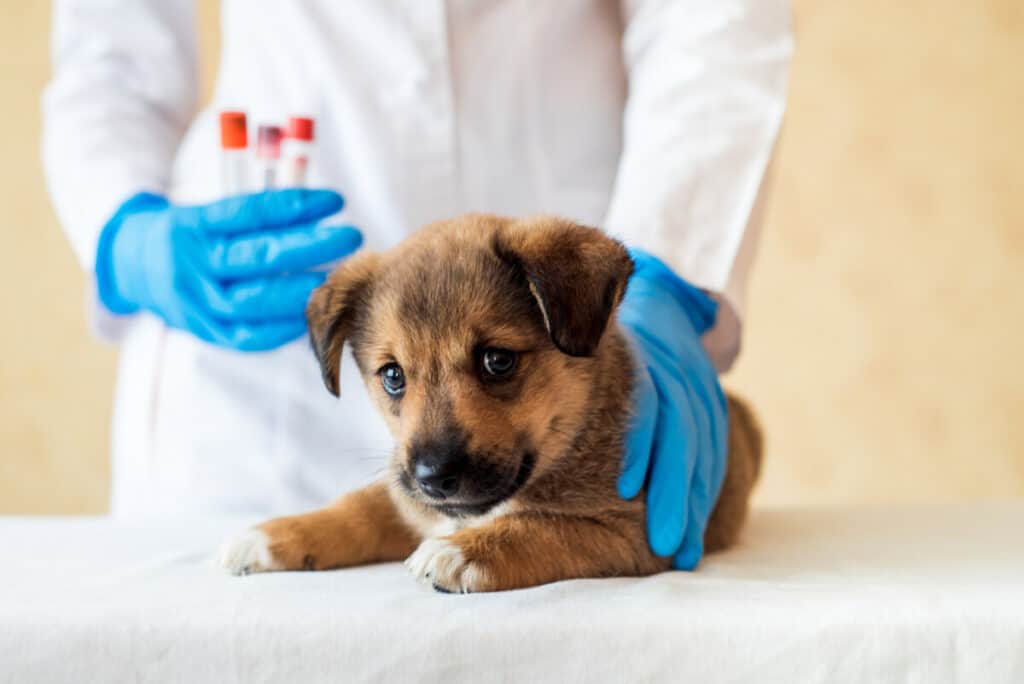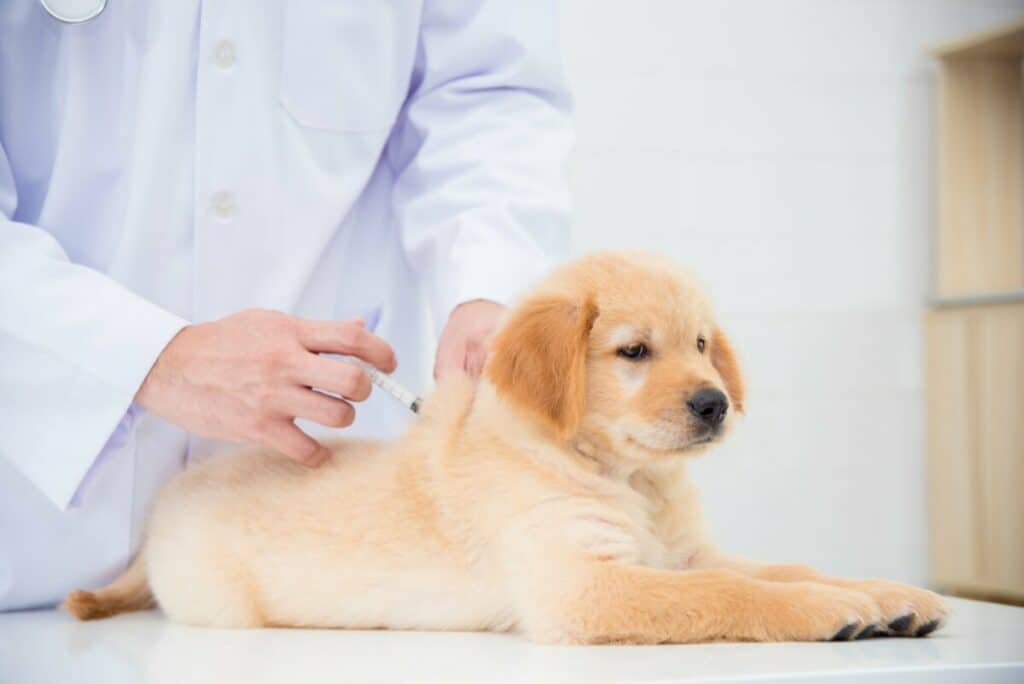
Getting their first shots is a pretty big deal for a little puppy. While shots are a necessary part of growing up and will help keep your puppy safe, you may be concerned about how your puppy will react afterward.
It is normal for puppies to get tired after shots. In fact, lethargy is the most common side effect dogs have after receiving a vaccine. This is a result of the subconscious effort their body is putting into responding to the vaccine and its contents. Lethargy like this should only last 1-2 days.
Apart from being tired, puppies may have other reactions to getting shots. Going forward, we will talk more about what normal reactions to vaccines puppies have and how to care for your puppy at this time. As you keep reading, you will have more knowledge about your puppy and the vaccination process.
Is it Normal for a Puppy to Be Tired After Receiving Shots?
It is completely normal for a puppy to be tired after getting shots. A puppy is so young that it may take more out of the puppy's body to adjust to a vaccine than that of an adult dog that is accustomed to getting vaccines.
When a vaccine is injected, the body receives a weakened or inactive part of the very disease that the vaccine protects you from. Through this, your body is able to create and send antibodies to fight the pathogen and create immunity or protection against that virus.
Although creating antibodies is a subconscious function, it can be draining to your body. That is why so many puppies are tired after receiving their shots. Even though you can't see it, their body is working hard. Puppies are usually active and have lots of energy, so take advantage of this time when they are more relaxed to get some extra cuddles in.
Do Puppies Feel Unwell after Vaccinations?
Your puppy may feel unwell after being vaccinated. It is common for dogs to experience side effects that cause them to not feel their best, and it is usually not a cause for concern.
However, if these side effects grow to be severe or last more than two days, you should consult your vet. In addition to lethargy, another common reaction is sneezing or cold-like symptoms. This is more common if the shot is administered through nose drops or spray than through an injection.
When trying to figure out how your puppy feels after getting a shot, think back on your experiences getting vaccinated. Personally, I often feel tired or weak, and usually plan to take a nap. Some people get cranky and want to be left alone when they are tired, while others want to be with people.
Dogs and humans react pretty similarly to getting their shots. Make sure to pay attention to the signs, both vocal and body language, that your dog is giving you to see if they feel particularly unwell or if it is just a natural reaction to the vaccine.
Other Side Effects of Vaccines
Along with lethargy or sleepiness, there are a few more side effects that may be affecting your pup. Some of these side effects are common and harmless, but others indicate a need for medical help. In those cases, take your pet to the animal hospital nearest to you.
Common Side Effects
- Experiencing discomfort at the vaccination site
- Redness or tenderness at the vaccination site
- Seeing slight swelling at the site of the injection
- Coughing or sneezing
- Runny nose
- Mild fever
- Loss of appetite
- Decreased activity/lethargy
When to Seek Veterinary Care
- Vomiting or diarrhea
- Itchy skin or hives
- Swelling of muzzle, face, neck, or eyes
- Persistent, extreme coughing
- Difficulty breathing
- Collapse or fainting

How to Care for Your Puppy After Their Shots
After your puppy is vaccinated, you will want to be prepared at home. Since your pup will likely be pretty sleepy, have some blankets or pillows in the car that they can lie on and a comfortable bed ready for when you get home. You should also have food and water available. Keep an eye on your puppy's intake of food and water to ensure they are adequately hydrated and aren't experiencing any loss of appetite.
If this is your puppy's first time getting a particular vaccine, you will need to monitor them closely to make sure that they are reacting well and not experiencing any negative side effects. Most pets don't need any special type of aftercare, but it is always a good idea to be safe rather than sorry, especially with such a young dog.
Another thing to be aware of is your puppy's body language. Since they are not feeling well, they might not want to be pet, cuddled, or played with. Instead of initiating interactions yourself, wait for your puppy to approach you. This gives them their space and allows them to be as comfortable as possible.
Why Do Puppies Need Shots?
Puppies need shots for the same reason we do, to protect them from potentially harmful pathogens and viruses. In their first few weeks, puppies receive the antibodies needed to fight infection from their mother by drinking her milk. However, as puppies are weaned, they lose access to this nutrient and antibody-rich meal and its benefits
In order to give puppies that extra boost they need to remain healthy and disease free, we give them vaccines. Based on information from the American Animal Hospital Association's Canine Task Force, puppies and other dogs need to receive at least the following four ‘core' vaccines.
- Canine Parvovirus
- Canine Distemper
- Hepatitis
- Rabies
There are also a few other vaccines that are recommended, but not considered a core vaccine, such as:
- Bordetella
- Canine Influenza
- Lyme vaccine
- Leptospirosis
If you are planning on boarding your puppy or sending them to doggy daycare, it is a good idea to get them vaccinated against all of these diseases so that they have the best protection available.
In fact, many establishments that have frequent furry visitors such as doggy daycares or groomers require that the dog be vaccinated against certain diseases. It is also required by law that a dog have a rabies vaccination in most states in the U.S. Your vet may consider giving your puppy more vaccinations based on their medical history and lifestyle or your travel habits.

Cindy is a prolific writer and online researcher who can't imagine life without dogs. There is scarcely a dog topic she has not researched or written about. Her love for dogs and helping dog parents is evident by the thousands of dogtemperament.com visitors who read her articles monthly. Most of all, each topic Cindy writes on helps forge a stronger bond and understanding between her and her happy Catahoula Leopard Dog Jossie.